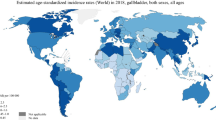Abstract
Gallbladder cancer is an uncommon malignancy and historically thought to have a poor prognosis. Nevertheless, interdisciplinary approaches to care and the advent of precision medicine have improved overall survival outcomes. Most agree that for patients with at least Stage IB disease, adjuvant chemotherapy and chemoradiation therapy improve overall survival. There are no standard guidelines for adjuvant radiation, but many agree to perform adjuvant radiation for R1 disease. Modern chemotherapy protocols have improved response rates for locally advanced disease; yet no clear guidelines for neoadjuvant therapy have been established. External beam, stereotactic radiation, and brachytherapy can provide local palliation and improve hyperbilirubinemia. Gemcitabine- and 5-FU-based chemotherapy combinations have long demonstrated activity in this disease; however, targeted therapy approaches including immunotherapy will serve as new treatment modalities in the future.
Similar content being viewed by others
References
American Cancer Society. Survival rates for gallbladder cancer. 2021. https://www.cancer.org/cancer/gallbladder-cancer/detection-diagnosis-staging/survival-rates.html.
Maruyama S, et al. Indications for extrahepatic bile duct resection due to perineural invasion in patients with gallbladder cancer. World J Surg Oncol. 2019;17(1):200.
Hatzeras I, et al. Elevated CA 19-9 levels portends poor prognosis in patients undergoing resection of biliary malignancies. HPB (Oxford). 2010;12(2):134–8.
Kim TH, Han SS, Park SJ, et al. Role of adjuvant chemoradiotherapy for resected extrahepatic biliary tract cancer. Int J Radiat Oncol Biol Phys. 2011;81:e853–9.
Horgan AM, et al. Adjuvant therapy in the treatment of biliary tract cancer: a systematic review and meta-analysis. J Clin Oncol. 2012;30(16):1934.
Gwak HK, Kim WC, Kim HJ, Park JH. Extrahepatic bile duct cancers: surgery alone versus surgery plus postoperative radiation therapy. Int J Radiat Oncol Biol Phys. 2010;78:194–8.
Wang SJ, et al. Nomogram for predicting the benefit of adjuvant chemoradiotherapy for resected gallbladder cancer. J Clin Oncol. 2011;20(35):4627.
Ben-Josef E, et al. SWOG S0809: a phase II intergroup trial of adjuvant capecitabine and gemcitabine followed by radiotherapy and concurrent capecitabine in extrahepatic cholangiocarcinoma and gallbladder carcinoma. J Clin Oncol. 2015;33(24):2617.
Primrose J, et al. Capecitabine compared with observation in resected biliary tract cancer (BILCAP): a randomized, controlled, multicentre, phase 3 study. Lancet Oncol. 2019;20(5):663–73.
Nakamura M, et al. Gemcitabine-based adjuvant chemotherapy for patients with advanced gallbladder cancer. Anticancer Res. 2014;34(6):3125–9.
Hakeen A, et al. The role of neoadjuvant chemotherapy or chemoradiotherapy for advanced gallbladder cancer – a systematic review. Eur J Surg Oncol. 2019;45:83–91.
Shroff R, et al. Gemcitabine, cisplatin, and nab-paclitaxel for the treatment of advanced biliary tract cancers. A phase 2 clinical trial. JAMA Oncol. 2019;5(6):824–30.
Polistina FA, et al. Chemoradiation treatment with gemcitabine plus stereotactic body radiotherapy for unresectable, nonmetastatic, locally advanced hilar cholangiocarcinoma. Radiother Oncol. 2011;99:120–3.
Momm F, et al. Stereotactic fractionated radiotherapy for Klatskin’s tumors. Radiother Oncol. 2010;95:99–102.
Valle J, et al. Cisplatin plus gemcitabine versus gemcitabine for biliary tract cancer. N Engl J Med. 2010;362(14):1273.
Kim ST, et al. Capecitabine plus oxaliplatin versus gemcitabine plus oxaliplatin as first-line therapy for advanced biliary tract cancers: a multicenter, open-label, randomized, phase III, noninferiority trial. Ann Oncol. 2019;30(5):788.
Lamarca A, et al. ABC-06. A randomized phase III, multicentre, open-label study of active symptom control (ASC) alone or ASC with oxaliplatin/5-FU chemotherapy (ASC+mFOLFOX) for patients with locally advanced/metastatic biliary tract cancers (ABC) previous-treated with cisplatin/gemcitabine chemotherapy. J Clin Oncol. 2019;37(Suppl 15):4003.
Valle JW, et al. New horizons for precision medicine in biliary tract cancers. Cancer Discov. 2017;7(9):943–62.
Javle M, et al. HER2/neu-directed therapy for biliary tract cancer. J Hematol Oncol. 2015;8:58.
Patel A, et al. Genomic landscape and targeted treatment of gallbladder cancer: results of a first ongoing prospective study. South Asian J Cancer. 2020;9(2):74–9.
Li M, et al. Genomic ERBB2/ERBB3 mutations promote PD-L1 mediated immune escape in gallbladder cancer: a whole-exome sequencing analysis. Gut. 2019;68(6):1024–33.
Abou-Alfa GK, et al. Pemigatinib for previously treated, locally advanced or metastatic cholangiocarcinoma: a multicentre, open-label, phase 2 study. Lancet Oncol. 2020;21(5):671–84.
Drilon A, et al. Efficacy of Larotrectinib in TRK fusion-positive cancers in adults and children. N Engl J Med. 2018;378:731–9.
Verlingue L, et al. Precision medicine for patients with advanced biliary tract cancers: an effective strategy within the prospective MOSCATO-1 trial. Eur J Cancer. 2017;87:122.
Kim RD, et al. A phase 2 multi-institutional study of nivolumab for patient with advanced refractory biliary tract cancer. JAMA Oncol. 2020;6(6):888.
Klein O, et al. Evaluation of combination nivolumab and ipilimumab immunotherapy in patients with advanced biliary tract cancers: subgroup analysis of a phase 2 nonrandomized clinical trial. JAMA Oncol. 2020;6(9):1405.
Silva VWK, et al. Biliary carcinomas: pathology and the role of DNA mismatch repair deficiency. Chin Clin Oncol. 2016;5(5):62.
Author information
Authors and Affiliations
Corresponding author
Editor information
Editors and Affiliations
Rights and permissions
Copyright information
© 2021 Springer Nature Switzerland AG
About this entry
Cite this entry
Gandhi, N., Chen, T. (2021). Nonsurgical Management of Gallbladder Cancer. In: Doria, C., Rogart, J.N. (eds) Hepato-Pancreato-Biliary Malignancies. Springer, Cham. https://doi.org/10.1007/978-3-030-37482-2_24-1
Download citation
DOI: https://doi.org/10.1007/978-3-030-37482-2_24-1
Received:
Accepted:
Published:
Publisher Name: Springer, Cham
Print ISBN: 978-3-030-37482-2
Online ISBN: 978-3-030-37482-2
eBook Packages: Springer Reference MedicineReference Module Medicine




